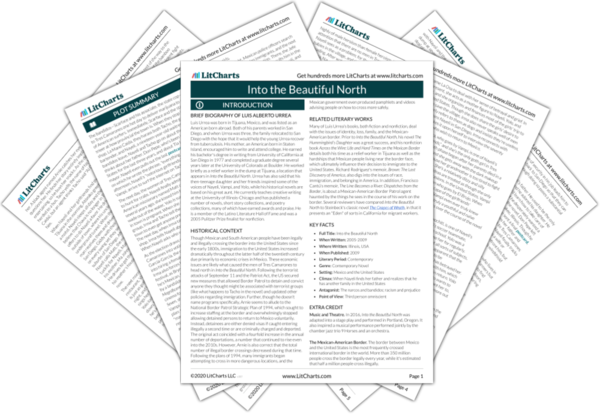Tía Irma Quotes in Into the Beautiful North
Karate, Tía Irma insisted, was good for the legs. Power on the field. But Nayeli was not fooled. To La Osa, life and love were war, and she expected Nayeli to win as many battles as possible.
Aunt Irma wanted her to beat up men.
"We are Mexicans," Irma informed the fruit seller—needlessly, he felt. "Mexicans eat corn and beans. Did you notice? The Aztec culture gave corn to the world, you little man. We invented it! Mexicans grow beans. How is it, then, that Mexicans cannot afford to buy and eat the corn and beans they grow?"
"These illegals come to Mexico expecting a free ride! Don't tell me you don't have Salvadorans and Hondurans in your school, getting the best education in the world! They take our jobs too [...] What we need is a wall on our southern border."
"They took my house from me!"
She stood there in her tattered nightgown and curlers.
"Can I sleep here?" he asked.
Irma had only been in charge of the town for scant days, and already the troubles were starting.
"You will see," Irma said. "The Americanos are kind. Friendly people. Generous people. They have quaint customs—they aren't really, shall we say, sophisticated like we are. You can't drink the water—it will give you diarrhea. But it's very clean there. Good food. You'll see."
"You are there to collect Mexicans," Irma reminded her. "Don't fall in love with that missionary!"
"I won't."
"And don't screw him, either. If you give him the milk for free, why would he buy the cow?"
"Tía!"
"Don't bring me any damned American surfers. And don't bring me any American babies. Bring me Mexicans."
Only when she was back in Tres Camarones did Irma hear from Chava's mother that he had impregnated an American woman […] Chava was marrying her.
That was the end of Irma, that day.
La Osa, her alter ego, appeared in all her relentless glory to inspire chagrin and penance in the homeland.
"Men are no good."
"My father is good."
Your father is a dog like all the other dogs."
"Brother," one of the men said, "take us back to Mexico.
"Please," said another.
The voices rose.
"It is too hard. We want to go home."
"We just need jobs."

Tía Irma Quotes in Into the Beautiful North
Karate, Tía Irma insisted, was good for the legs. Power on the field. But Nayeli was not fooled. To La Osa, life and love were war, and she expected Nayeli to win as many battles as possible.
Aunt Irma wanted her to beat up men.
"We are Mexicans," Irma informed the fruit seller—needlessly, he felt. "Mexicans eat corn and beans. Did you notice? The Aztec culture gave corn to the world, you little man. We invented it! Mexicans grow beans. How is it, then, that Mexicans cannot afford to buy and eat the corn and beans they grow?"
"These illegals come to Mexico expecting a free ride! Don't tell me you don't have Salvadorans and Hondurans in your school, getting the best education in the world! They take our jobs too [...] What we need is a wall on our southern border."
"They took my house from me!"
She stood there in her tattered nightgown and curlers.
"Can I sleep here?" he asked.
Irma had only been in charge of the town for scant days, and already the troubles were starting.
"You will see," Irma said. "The Americanos are kind. Friendly people. Generous people. They have quaint customs—they aren't really, shall we say, sophisticated like we are. You can't drink the water—it will give you diarrhea. But it's very clean there. Good food. You'll see."
"You are there to collect Mexicans," Irma reminded her. "Don't fall in love with that missionary!"
"I won't."
"And don't screw him, either. If you give him the milk for free, why would he buy the cow?"
"Tía!"
"Don't bring me any damned American surfers. And don't bring me any American babies. Bring me Mexicans."
Only when she was back in Tres Camarones did Irma hear from Chava's mother that he had impregnated an American woman […] Chava was marrying her.
That was the end of Irma, that day.
La Osa, her alter ego, appeared in all her relentless glory to inspire chagrin and penance in the homeland.
"Men are no good."
"My father is good."
Your father is a dog like all the other dogs."
"Brother," one of the men said, "take us back to Mexico.
"Please," said another.
The voices rose.
"It is too hard. We want to go home."
"We just need jobs."











